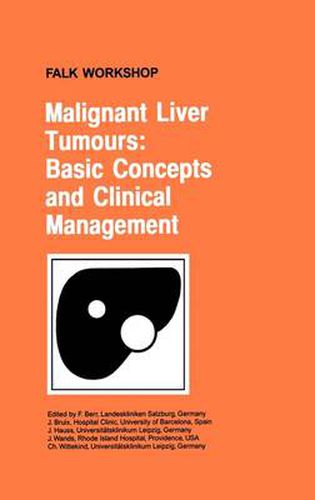Readings Newsletter
Become a Readings Member to make your shopping experience even easier.
Sign in or sign up for free!
You’re not far away from qualifying for FREE standard shipping within Australia
You’ve qualified for FREE standard shipping within Australia
The cart is loading…






Hepatocellular carcinoma (HCC) and cholangiocarcinoma (CC), both increasing in incidence, have become a major topic of basic and clinical research as well as clinical practice in hepatology. Experts in the field update the current concepts on the carcinogenesis of HCC and CC such as genetic alterations in the pathways of cell cylce and apoptosis regulation, the hypothesis of dedifferentiation of hepatocytes to the malignant phenotype vs that of activation of hepatic progenitor cells incapable of maturation (maturation arrest hypothesis). In spite of an increasing number of genetic alterations described in human HCC as well as cell regulatory pathways tested in experimental HCC models, the key hits causing progression of the cell cycle in imbalance with apoptosis, tissue invasive growth and metastatic potential of cell clones still remain elusive. Very powerful genomic and proteomic techniques are promising insights into the carcinogenesis of liver malignancies that will allow more efficient therapeutic strategies. The current concepts on risk profiling, surveillance of risk groups and therapeutic strategies are evidence-based for HCC and less detailed for CC. Surveillance of risk groups improves detection of liver tumours in curable stages. Best strategies for curative treatment of HCC use neoadjuvant antitumour therapies before liver transplantation and a role is emerging for living donor-related liver transplantation. New palliative therapies for HCC are in the experimental stage with biological response modifiers, including angiogenesis inhibitors, and entering phase II clinical trials with the alpha-fetoprotein derived vaccines. This book, the proceedings of Falk Workshop No. 127, held in Leipzig, Germany, January 24-25, 2002 (as Pre-meeting of the Annual Meeting of the German Association for the Study of the Liver) summarizes the expert knowledge on the carcinogenesis, surveillance of risk groups, and clinical management of malignant liver tumours.
$9.00 standard shipping within Australia
FREE standard shipping within Australia for orders over $100.00
Express & International shipping calculated at checkout
Hepatocellular carcinoma (HCC) and cholangiocarcinoma (CC), both increasing in incidence, have become a major topic of basic and clinical research as well as clinical practice in hepatology. Experts in the field update the current concepts on the carcinogenesis of HCC and CC such as genetic alterations in the pathways of cell cylce and apoptosis regulation, the hypothesis of dedifferentiation of hepatocytes to the malignant phenotype vs that of activation of hepatic progenitor cells incapable of maturation (maturation arrest hypothesis). In spite of an increasing number of genetic alterations described in human HCC as well as cell regulatory pathways tested in experimental HCC models, the key hits causing progression of the cell cycle in imbalance with apoptosis, tissue invasive growth and metastatic potential of cell clones still remain elusive. Very powerful genomic and proteomic techniques are promising insights into the carcinogenesis of liver malignancies that will allow more efficient therapeutic strategies. The current concepts on risk profiling, surveillance of risk groups and therapeutic strategies are evidence-based for HCC and less detailed for CC. Surveillance of risk groups improves detection of liver tumours in curable stages. Best strategies for curative treatment of HCC use neoadjuvant antitumour therapies before liver transplantation and a role is emerging for living donor-related liver transplantation. New palliative therapies for HCC are in the experimental stage with biological response modifiers, including angiogenesis inhibitors, and entering phase II clinical trials with the alpha-fetoprotein derived vaccines. This book, the proceedings of Falk Workshop No. 127, held in Leipzig, Germany, January 24-25, 2002 (as Pre-meeting of the Annual Meeting of the German Association for the Study of the Liver) summarizes the expert knowledge on the carcinogenesis, surveillance of risk groups, and clinical management of malignant liver tumours.